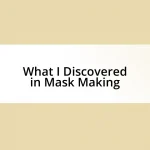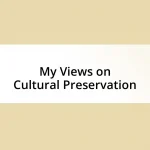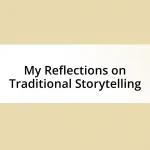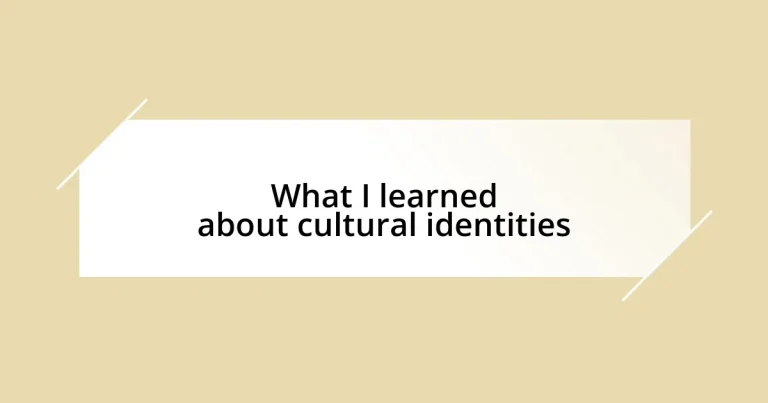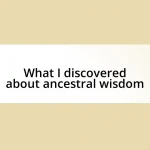Key takeaways:
- Cultural identities are shaped by family traditions, education, community engagement, and exposure to diverse experiences, continually evolving through interactions.
- Recognizing and celebrating cultural identities fosters understanding, nurtures inclusivity, and helps dismantle stereotypes and misconceptions.
- Personal experiences and exchanges, such as sharing stories and participating in cultural events, enrich our understanding and connection to our own and others’ identities.
- Challenges in embracing cultural identities include external pressures, clashes with societal norms, and the internal struggle of self-acceptance.
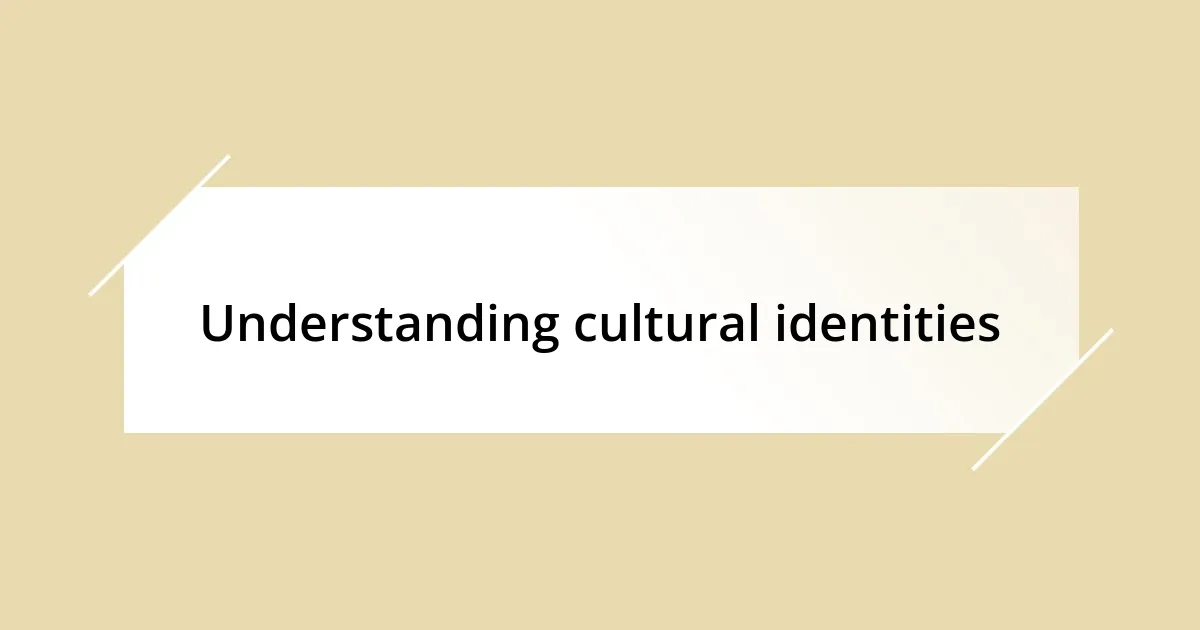
Understanding cultural identities
Understanding cultural identities is like peeling an onion; each layer reveals unique values, traditions, and experiences. For me, visiting my friend’s family during their Diwali celebration opened my eyes to how cultural practices shape connections within families and communities. I couldn’t help but wonder, what aspects of my own culture are woven into the fabric of my daily life?
Every encounter we have with someone from a different background enriches our understanding of culture. I remember a moment at a local food festival when I tried a dish from a cuisine I’d never tasted before. The flavors sparked not just my taste buds but also deep conversations about family recipes and the stories behind them. Have you ever considered how food can serve as a window into someone’s identity?
Cultural identities are dynamic; they evolve constantly through interactions and shared experiences. Reflecting on my own journey, I realize how travel has shaped my perspective on culture. It prompts me to ask: how do our identities adapt and transform when we step outside our own familiar settings? The beautiful complexity of cultural identities is a reminder that we are all part of a richer tapestry of human experience.
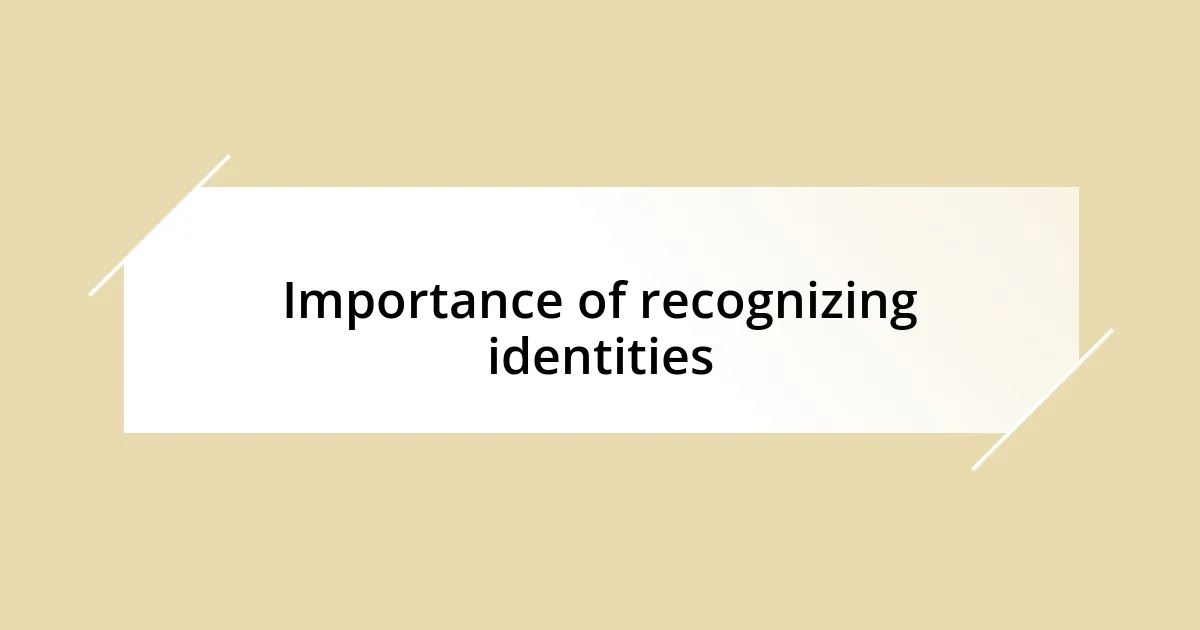
Importance of recognizing identities
Recognizing cultural identities is crucial in fostering understanding and respect among diverse groups. I remember attending a local community meeting where individuals shared their personal stories; it was eye-opening to see how experiences shape perspectives. Each story reminded me that acknowledging someone’s identity isn’t just about labels; it’s about uncovering the essence of their lived experiences.
When we value our diverse identities, we create a welcoming environment that nurtures inclusion. I once volunteered at an organization that focused on helping immigrants. Hearing their journeys not only humbled me but also made me reflect on my own place in society. It hit me that by embracing different identities, we empower each other to thrive and contribute to a greater community.
Moreover, recognizing identities aids in dismantling stereotypes and misconceptions. I recall a conversation with a colleague who initially held a narrow view about a particular culture. As we engaged in deep discussions, I could see those barriers gradually break down. This transformation highlighted the importance of dialogue and openness in fostering connections that transcend cultural divides.
| Importance of Recognizing Identities | Examples/Insights |
|---|---|
| Fosters Understanding | Personal Stories from Community Meetings |
| Nurtures Inclusion | Experiences in Volunteering |
| Dismantles Stereotypes | Real Conversations with Colleagues |
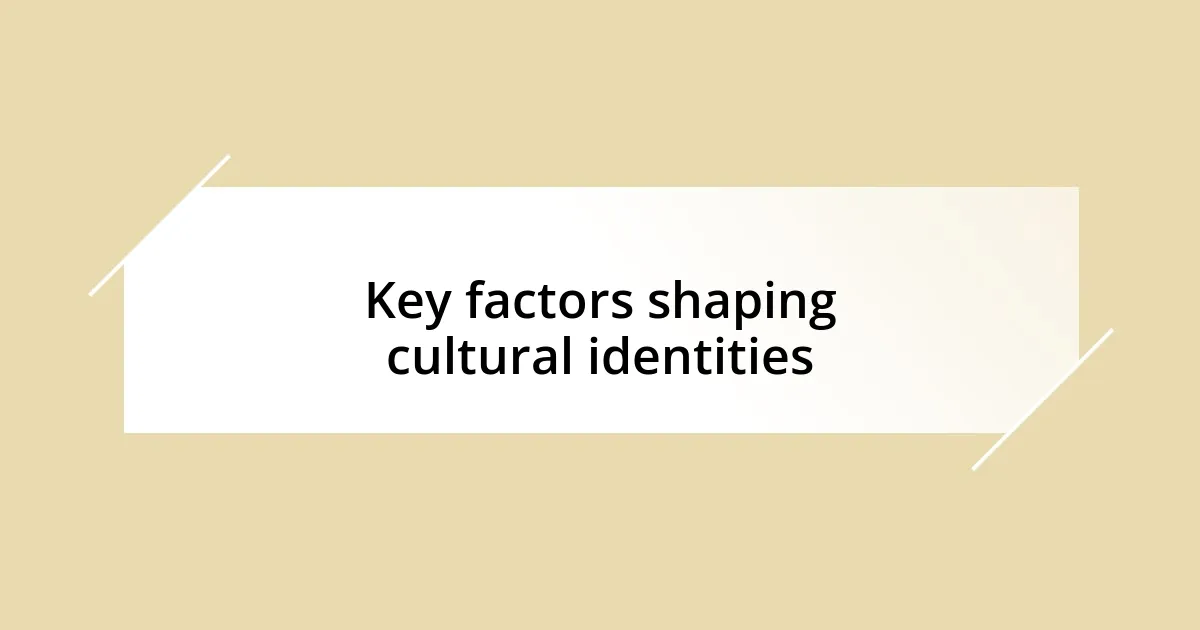
Key factors shaping cultural identities
Cultural identities are shaped by various influences, each weaving together the fabric of who we are. For instance, I’ve often thought about how family traditions anchor us within our culture. When I learned to cook my grandmother’s recipes, it wasn’t just about the flavors; it became a ritual connecting me to generations past, reminding me of our shared heritage. Similarly, education plays a critical role, as it introduces ideas and perspectives that can challenge or reinforce our cultural views.
Here are some key factors that influence cultural identities:
- Family Traditions: They create a sense of belonging and continuity across generations.
- Education: Schools and learning environments expose us to different ideas, shaping our worldview.
- Community Engagement: Participating in local traditions fosters a stronger connection to one’s culture.
- Media Representation: The portrayal of cultures in films, books, and news can influence perceptions and self-identification.
- Global Interactions: Traveling or interacting with diverse groups enriches our understanding and appreciation of various cultural backgrounds.
As I reflect, I recall a time when I witnessed a cultural exchange event. There was a powerful moment when individuals from different cultures shared their music and dances. The infectious energy in the room brought forth not just entertainment but also a deep sense of unity and respect. Such experiences make it evident that our cultural identities are not just inherited; they are continually reshaped by our interactions with the world around us.
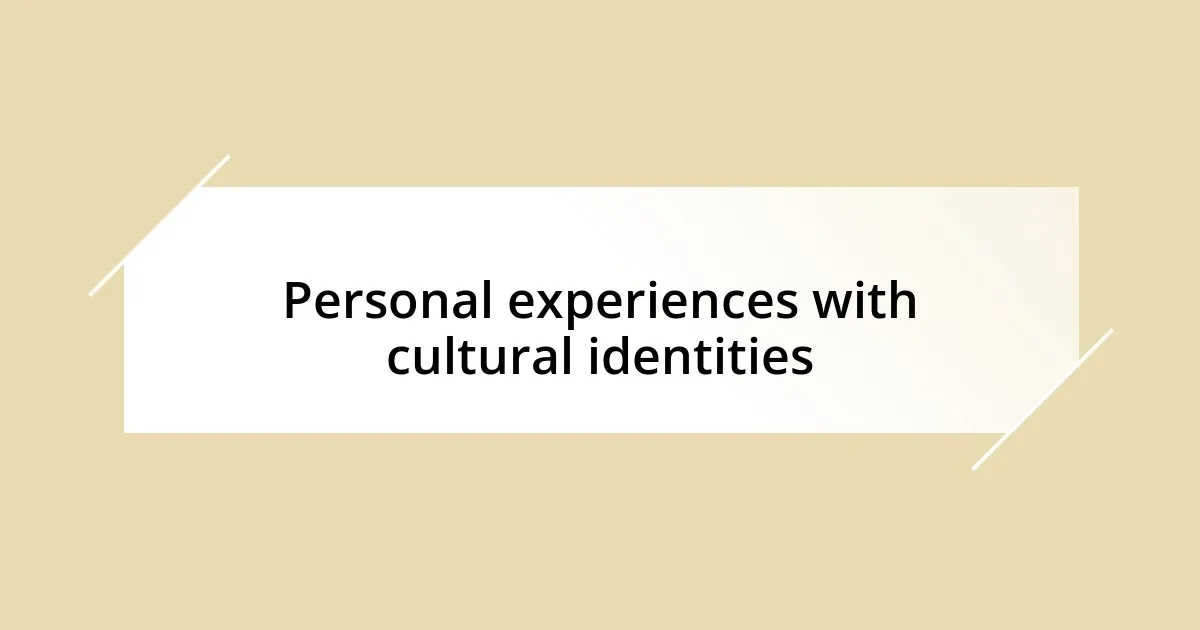
Personal experiences with cultural identities
As I’ve navigated my own cultural identity, I’ve often found myself reflecting on the moments that define it. One particularly vivid memory comes from a family gathering where my relatives shared stories from their childhoods. Listening to their tales brought back emotions I didn’t even realize I had—an aching nostalgia mixed with pride in our shared heritage. It made me wonder: how do our family stories shape our understanding of who we are?
In college, I took part in an international student exchange program. My roommate hailed from Brazil, and our late-night conversations about our cultures were nothing short of enlightening. I vividly remember the joy on her face as she introduced me to traditional Brazilian snacks. This experience sparked a connection that transcended mere friendship; it was a celebration of our unique backgrounds. I realized then that these exchanges enrich not just our understanding, but our friendships as well.
I also had a transformative experience during a cultural festival in my city. As I wandered through booths showcasing diverse foods and traditions, I found myself captivated by an indigenous dance performance. The dancers wore vibrant costumes that told stories of resilience and heritage. I felt a deep appreciation for the richness of cultures around us and a renewed understanding of the importance of preserving these traditions. Have you ever felt that rush of connection when you witness another culture express itself? It’s a powerful reminder that cultural identities not only define us individually but also unite us as a community.
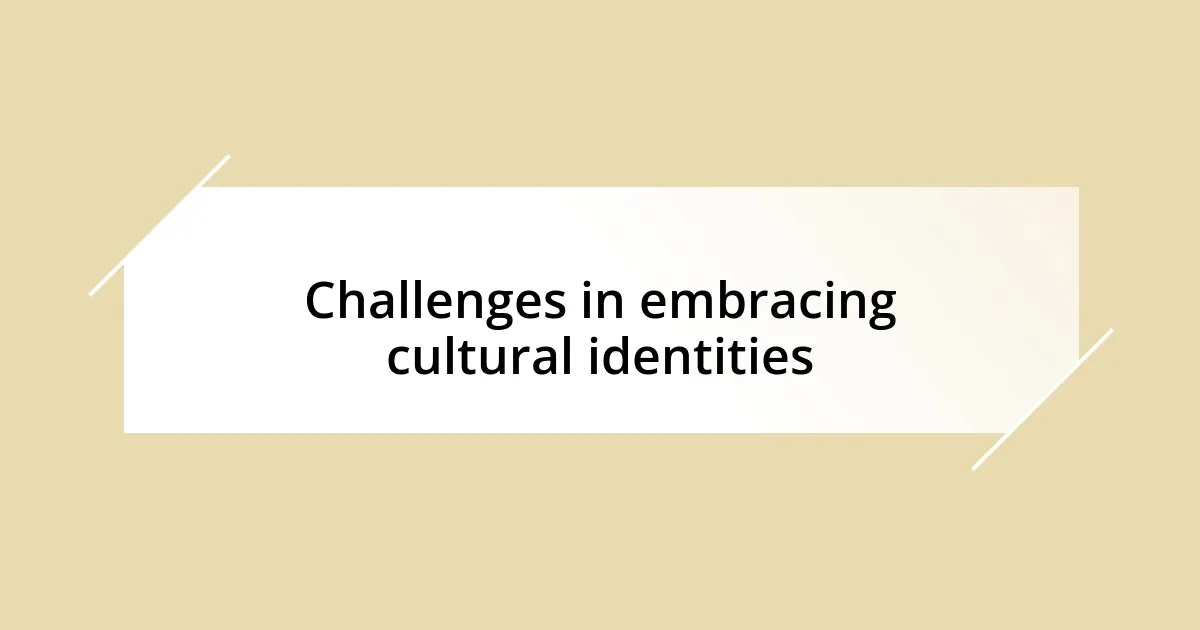
Challenges in embracing cultural identities
Navigating the complexities of cultural identities can be daunting, especially when external pressures arise. I remember grappling with my dual heritage during high school; peers would often question which side of my culture I identified with more. It was a challenging moment, making me feel as though I had to pick a side rather than appreciating the beauty of both. Have you ever felt that tension between cultures? It’s not just about choice; it’s about belonging.
Another challenge emerges when cultural practices clash with mainstream societal norms. I once participated in a traditional ceremony that my family deeply values. However, at my workplace, discussing such traditions often led to awkward misunderstandings or dismissive comments. I found myself questioning whether I could fully embrace my culture without facing judgment. It made me realize that sharing cultural experiences is a delicate dance—how do we encourage appreciation without sparking discomfort?
Finally, there’s the internal struggle of self-acceptance that often complicates embracing cultural identities. For instance, I’ve had moments where I felt disconnected from my roots, especially during my travels abroad. Surrounded by locals celebrating their heritage, I’d sometimes grapple with feelings of inadequacy as I questioned my authenticity. It was humbling to remember that everyone’s journey with cultural identity is unique. How do you reconcile those moments of doubt? It helps to acknowledge that our experiences, no matter how conflicting, are part of what shapes our identities.
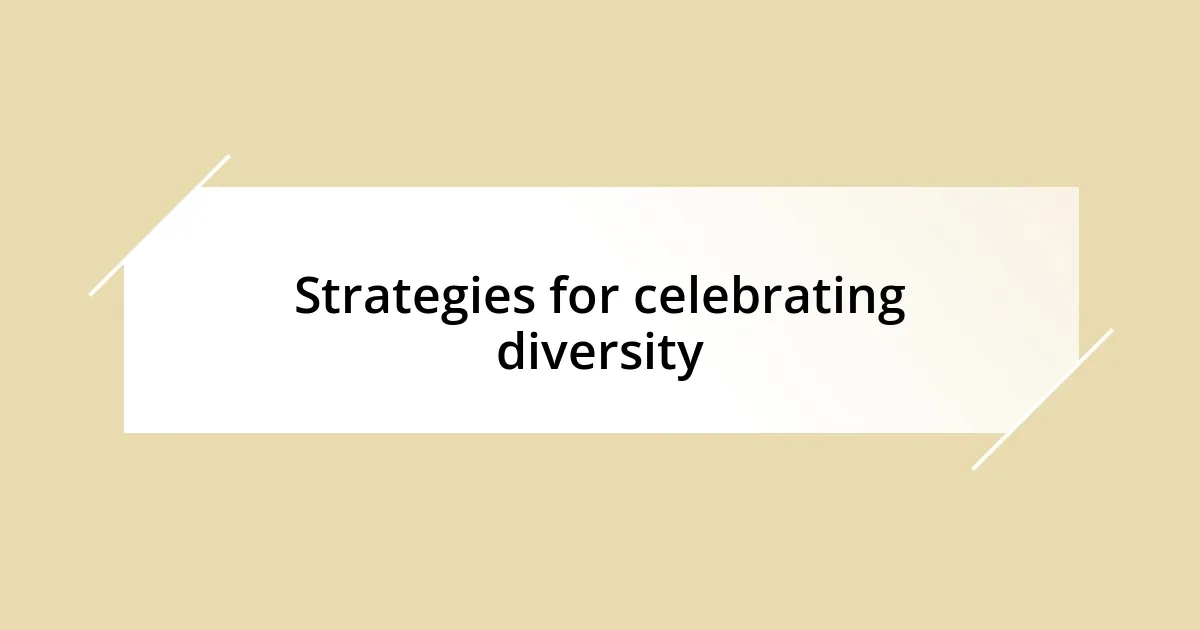
Strategies for celebrating diversity
Fostering a celebration of diversity requires intentional actions. One strategy I’ve found effective is hosting potluck gatherings. Everyone can contribute dishes from their cultural backgrounds, and it offers a delightful way to experience different flavors and stories. It’s a simple yet profound way to spark conversations and connect over the shared joy of food. Have you ever tried this? It turns meals into a beautiful tapestry of cultures.
Another approach is participating in local cultural events or workshops. Recently, I decided to join a dance class that focused on traditional African rhythms. Not only did I learn the art and technique behind the dances, but I also connected with people from diverse backgrounds. Each session brought a sense of community and shared laughter, overshadowing our differences. Has there been a moment when you felt the magic of learning something new alongside others? Those instances can leave lasting impressions.
Finally, I think it’s crucial to engage in educational discussions about cultural histories and contributions. I remember a panel I attended where speakers shared personal narratives that highlighted their cultural journeys. I walked away with a richer understanding of not just the individuals’ backgrounds, but also the societal contexts that shape their experiences. When we take time to listen and learn from each other, we cultivate an environment where diversity is not just acknowledged, but celebrated. How often do you make space for such dialogues in your life? They can truly transform perspectives.






